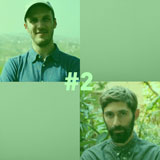Panel #2 REPRESENTATIONS AND INFORMATION
Guest speakers:
The Funambulist Magazine
Léopold Lambert
Forensic Architecture
Stefanos Levidis
Coordination: Fabiano Micocci
Response: Phoebe Giannisi
CV
The Funambulist Magazine is a printed and digital publication published once every two months. Started in September 2015, it operates in parallel of the blog The Funambulist (started in 2010) and its podcast, Archipelago (started in 2013) that has published more than 110 conversations with thinkers/creators of the world for the last three years. As the magazine's subtitle, "Politics of Space and Bodies," suggests, this publication is dedicated to examine the political relationships between the designed/built environment and bodies. In doing so, it attempts to construct bridges between the disciplines of design, those of the humanities and post colonial studies, as well as the world of political activism. In July 2016, its sixth issue was published, concluding the first year of the magazine that successively investigated "Militarized Cities", "Suburban Geographies", "Clothing Politics", "Carceral Environments", "Design & Racism" and "Object Politics".
Léopold Lambert is a Paris-based architect who also lived and worked in Hong Kong, Mumbai, and New York. He is the editor-in-chief of The Funambulist magazine, its blog, and its podcast, Archipelago. He is the author of several books: Weaponized Architecture: The Impossibility of Innocence (dpr-barcelona, 2012); The Funambulist Pamphlets, Vol. 1–11 (punctum books, 2013–15); Topie Impitoyable: The Corporeal Politics of the Cloth, the Wall, and the Street (punctum, 2016); and La politique du bulldozer (The Politics of the Bulldozer, Éditions B2, 2016). He is also the editor of The Funambulist Papers, Vol. 1–2 (punctum, 2013–15). In addition to these media (designing/writing/editing/recording), he also regularly creates cartographic work to address certain spatial political conditions in Palestine and in the French banlieues (suburbs), and occasionally publishes photographic work.
Forensic Architecture is a multidisciplinary research group led by Eyal Weizman based at Goldsmiths, University of London. Forensic Architecture was formed in 2010 as a research project and a new paradigm of architectural practice that uses spatial tools, techniques and technologies in order to investigate cases of state violence and human rights violations at an international scale. FA develops evidence based techniques and is assigned architectural and multimedia research by communities who have been severely affected by state violence. FA also collaborates with juridical bodies and international organizations that are charged with the defense of human rights and environmental justice. FA´s practices are developed as a response to several converging phenomena, such as the urbanisation of warfare, the erosion of trust in evidence in relation to state crimes and human rights violations, the emergence and proliferation of open source media (or 'image flotsam'), the increased use of smartphone footage in documenting human rights violations in urban conflict, and the need for civil society to have its own means of evidence production for application in law, politics and advocacy.
Stefanos Levidis is an architect, researcher and visual practitioner. He is a project coordinator at the research agency Forensic Architecture, where he oversees the agency’s work on borders and migration. His PhD dissertation, submitted at the Centre for Research Architecture, Goldsmiths University, and titled Border Natures. The Environment as Weapon at the Edges of Greece, interrogates the entanglement of border defence strategies with the natural environment at the external borders of the EU, with a focus on the Greek case. He also holds a Bachelor’s and a Master’s in Architecture from the Bartlett School of Architecture, University College London, as well as a Master’s in Advanced Architecture from the Institute of Advanced Architecture of Catalonia. As a member of Forensic Architecture he was part of the team nominated for the Turner Prize in 2018, and has lectured and exhibited internationally. His own spatial and visual practice has also been presented and published internationally, and his investigative research has been submitted to courts in support of human rights cases. He has been awarded the Stavros Niarchos Foundation Artist Fellowship by ARTWORKS (2021).

